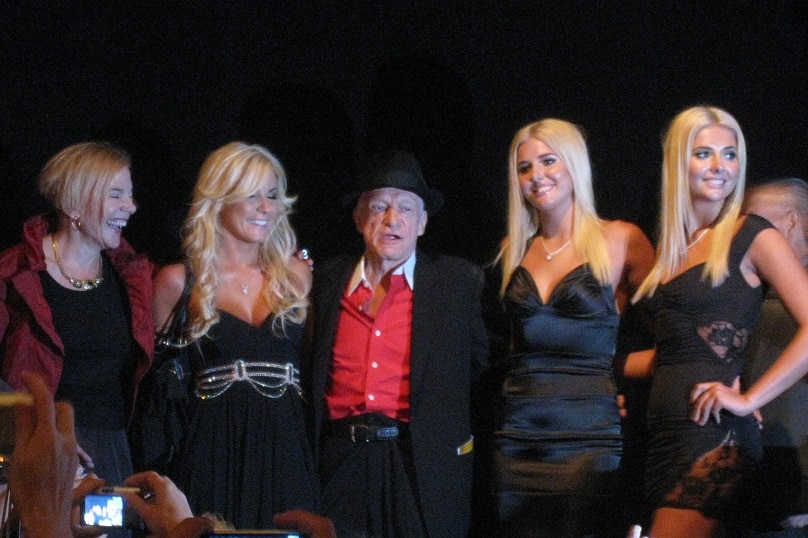
Hugh Hefner is dead. He launched his career, and went on to almost singlehandedly legitimize the porn industry, by buying a nude photo of Marilyn Monroe to use as a centerfold for the first Playboy magazine in 1953. He spent the next several decades building a tawdry empire out of the bodies of rail-thin, silicone-inflated, spray-tanned concubines. And it wasn’t only women’s bodies he used. The consumers of porn were also his victims, as he and his ilk trained men and anyone else who consumes pornography to respond only to erotic images, and not to individual people.
Most Catholics and also many in the secular world can see how vile his work was. We can see that it’s wrong to use people when the end game is more wrongness. Hefner is almost an old fashioned bad guy who crammed his mansion with bodies and fattened his bank account by cultivating eating disorders and mental illness in women, and masturbation and infidelity in men, all under the aegis of liberation and consent. His evil is so blatant and unrepentant, it’s almost quaint. You can all but hear his villainous cackle from the grave as the industry he created feeds bodies into the flames of lust.
But stop. Yes, porn is horrible. Yes, unfettered lust is monstrous, and leads to psychological and social ills of every kind. Yes, but what is at the heart of it all? What is the source of all this evil?
It’s the willingness to use people. And it’s just as wrong to use people for good motives as it is to use them for bad motives.

Catholics, take note. We are quick to condemn sin, but slower to identify why sin is forbidden. More and more, I see that using people — treating them as things, behaving as if they are there to help us get what we want — is at the heart of nearly every sin we can commit against each other. This is why the Church loves sex but hates lust. We are created to love and be loved, not to use and be used. We may not use each other, even if we want to use them for a good reason.
And I could go on. I’ve been guilty of this myself, and I’m trying to stop. It doesn’t matter how good the cause is. We must not use people.
When you’re plugged into the news and fighting culture wars, as many of us are called to do, it’s all too easy to pluck a name out of the stream of information and say, “Look! Here is a person who demonstrates just what I mean! This human is what is wrong with the world!”
But we may not do evil that good may come of it. And using people is evil.
It’s a fine line. We cannot be naive, and we cannot be blind. When people around us say and do things worthy of response, it may be our duty to respond to them, especially when the demonstrate widespread and disastrous confusion over important moral issues. But, as Kate Cousino says,
It’s very human to want to draw on communal myths and icons when making an argument or appealing to an audience. But when does that story-telling, that invoking of images, shade over into objectifying use of a human person?
One question I ask myself: What is likely to happen to the person in question, if I use that person’s story to make a point? No matter how valid or vital the point, it’s never more important than the actual human person involved. We can’t, like Weston in Lewis’ space trilogy, be willing to sacrifice individual human beings for the sake of the furtherance of mankind in general — or, like the doctor in The Brother’s Karamazov, allow ourselves to care more for mankind than we do for individual men. The doctor confesses that, not only does he fail in his love for individuals, but his love for humanity in general leads him to love individuals less:
The more I love humanity in general the less I love man in particular. In my dreams, I often make plans for the service of humanity, and perhaps I might actually face crucifixion if it were suddenly necessary. Yet I am incapable of living in the same room with anyone for two days together. I know from experience. As soon as anyone is near me, his personality disturbs me and restricts my freedom.
And what of Hugh Hefner and his legacy? I don’t actually believe he was only in it for the money. I am willing to believe that some dreadful, shrivelled part of him believed that, by making sex cheap and porn socially acceptable, he was doing something good for the world, something that needed to be done. His Playboy Foundation supported not only abortion (which is billed as liberation, but actually makes it much easier to exploit women), but civil rights.
Even Hefner, in other words, persuaded at least some part of himself that it was okay to use people, as long as you were using them for something that seems good.
He’s not alone in thinking we may feed as many bodies we like into the oven, as long as we tell ourselves we’re building a fire that benefits all of mankind (and never mind that mankind is made up of individual bodies just like the last one that passed through our hands).
It’s wrong when Hugh Hefner does it, and it’s wrong when anyone does it. If we catch ourselves feeding an individual human into the flames to fuel the fire of our just cause, then we are no longer just. The more we allow ourselves to use individual people, the less we will be able to respond to individual people. And like the porn addict, we will find ourselves less and less able to connect with the very ones we claim to love.
